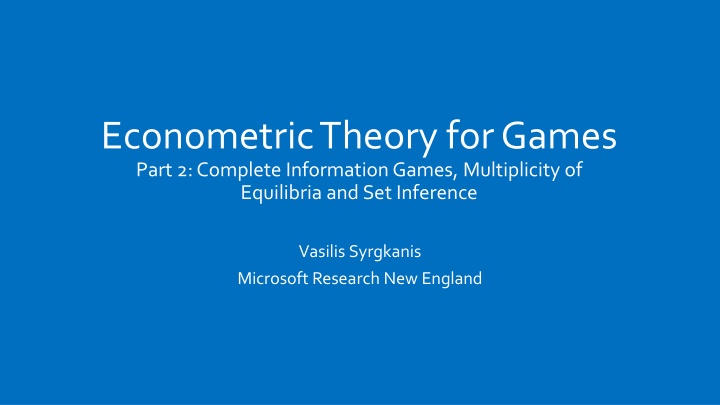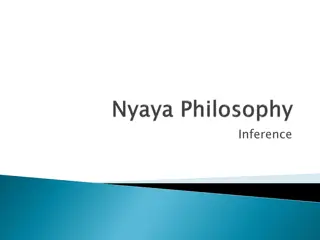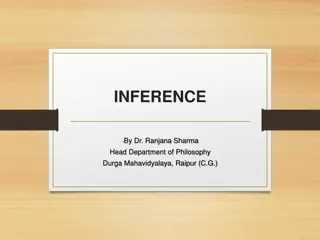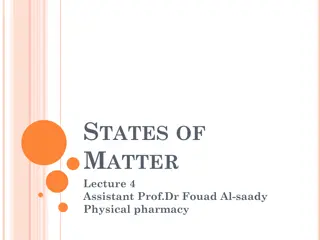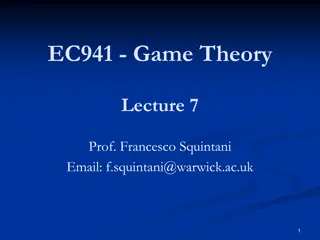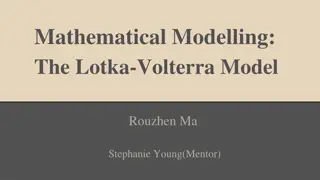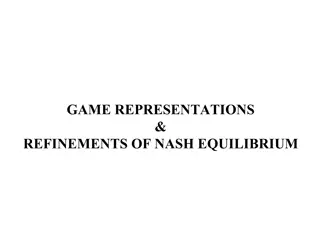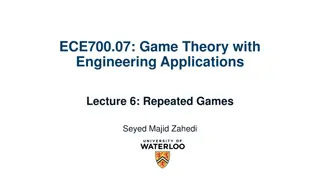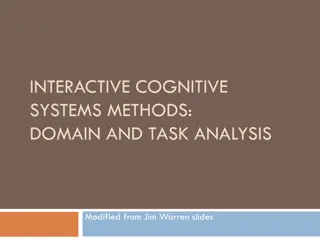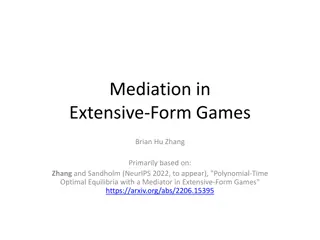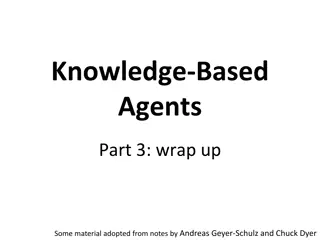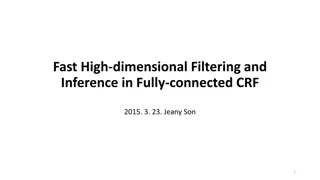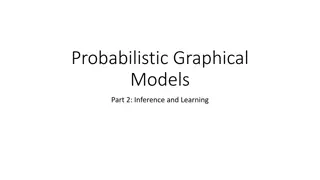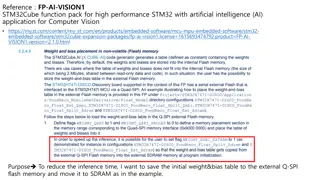Econometric Theory for Games: Complete Information, Equilibria, and Set Inference
This tutorial series discusses econometric theory for games, covering estimation in static games, Markovian dynamic games, complete information games, auction games, algorithmic game theory, and mechanism design. It explores topics like multiplicity of equilibria, set inference, and mechanism design for data science. The content delves into general dynamic games, steady-state Markovian dynamic games, and non-parametric estimation in dynamic games.
Download Presentation

Please find below an Image/Link to download the presentation.
The content on the website is provided AS IS for your information and personal use only. It may not be sold, licensed, or shared on other websites without obtaining consent from the author.If you encounter any issues during the download, it is possible that the publisher has removed the file from their server.
You are allowed to download the files provided on this website for personal or commercial use, subject to the condition that they are used lawfully. All files are the property of their respective owners.
The content on the website is provided AS IS for your information and personal use only. It may not be sold, licensed, or shared on other websites without obtaining consent from the author.
E N D
Presentation Transcript
Econometric Theory for Games Part 2: Complete Information Games, Multiplicity of Equilibria and Set Inference Vasilis Syrgkanis Microsoft Research New England
Outline of tutorial Day 1: Brief Primer on Econometric Theory Estimation in Static Games of Incomplete Information: two stage estimators Markovian Dynamic Games of Incomplete Information Day 2: Discrete Static Games of Complete Information: multiplicity of equilibria and set inference Day 3: Auction games: Identification and estimation in first price auctions with independent private values Algorithmic game theory and econometrics Mechanism design for data science Econometrics for learning agents
General Dynamic Games [Bajari-Benkard-Levin 07], [Pakes-Ostrovsky-Berry 07], [Aguirregabiria-Mira 07], [Ackerberg-Benkard-Berry-Pakes 07], [Bajari-Hong-Chernozhukov-Nekipelov 09]
Steady-State Markovian Dynamic Games ?? ??+1 1. 4. State probabilistically transitions to next state, based on prior state and on action profile Private shocks i.i.d., independent of state and private information to each player t ?1? ?1 ??? t ?n 2. 3. ?1??,??,??? = ?1??,?? + ????? Each player receives payoff ?= ????,??? Each player ? picks an action ?? based on current state and on private shock ????,??,??? = ????,?? + ????? Steady state policy: time-independent mapping from states, shocks to actions ???;?,? = ? ?=0 ????? ??,??,??,??? ? ?0= ?;? = ??? ?,?0,? + ??0?(?,?0) shockless discounted expected equilibrium payoff. Markov-Perfect-Equilibrium: player chooses action ??if: ????,? + ???? ???? ,? + ??(?? )
Dynamic Games: First Stage [Bajari-Benkard-Levin 07] Let ????? : probability of playing action ?? conditional on state ? Suppose ?? are extreme value and ??0,? = 0, then log??(??|?) log??0 ? = ??(??,?) Non-parametrically estimate ????? Invert and get estimate ????,? = log ??(??|?) log ??0 ? We have a non-parametric first-stage estimate of the policy function: ???,?? = argmax ??(??,?) ??(??) ?? ?? Combine with non-parametric estimate of state transition probabilities Compute a non-parametric estimate of discounted payoff for each policy, state, parameter tuple: ??(?,?;?), by forward simulation
Dynamic Games: First Stage [Bajari-Benkard-Levin 07] If payoff is linear in parameters: ???,?,??;? = i?,?,?? ? Then: ???,?;? = ???,? ? Suffices to do only simulation for each (policy, state) pair and not for each parameter, to get first stage estimates ??(?,?)
Dynamic Games: Second Stage [Bajari-Benkard-Levin 07] We know by equilibrium: ;? = ???,?;? ???? ,? ?;? 0 ? ?,?,?? Can use an extremum estimator: Definite a probability distribution over (player, state, deviation) triplets Compute expected gain from [deviation]- under the latter distribution ? ? = ?[min{? ?,?,?? By Equilibrium ? ?0 = 0 = min ? Do empirical analogue with estimate ?: ? ?,?,?? coming from first stage estimates Two sources of error: Error of ? and P ? ?,? : ?-consistent, asymptotically normal, for discrete actions/states Simulation error: can be made arbitrarily small by taking as many sample paths as you want ;? ,0}] ? ? ;? = ?? ?,?;? ???? , ? ?;?
Recap of main idea At equilibrium agents have beliefs about other players actions and best respond If econometrician observes the same information about opponents as the player does then: Estimate these beliefs from the data in first stage Use best-response inequalities to these estimated beliefs in the second stage and infer parameters of utility
Complete Information Games [Bresnahan-Reiss 90,91, Berry 92, Tamer 03, Cilliberto- Tamer 09, Beresteanu-Molchanov-Mollinari 07]
Entry Game Two firms deciding whether to enter a market Entry decision ?? {0,1} Profits from entry: ?1= ? ?1+ ?2?1+ ?1 ?2= ? ?2+ ?1?2+ ?2 Equilibrium: ??= 1{?? 0} ?? ??: at each market i.i.d. from known distribution ?: observable characteristics of each market ??,??: constants across markets
Assume ?1,?2< 0 [Bresnahan-Reiss 90,91], [Berry 92] ?1= ? ?1+ ?2?1+ ?1 ?2= ? ?2+ ?1?2+ ?2 ?2 (0,1) Player 1 enters only in monopoly ?1 ?1,?1 ?1 Player 2 always enters ?2 ?2,?2 ?2 (1,1) Both players always enter ?1 ?1,?1 ?1 ?2 ?2,?2 ?2 ?1 ?1,?1 ?1, ?2,?2 ?2 Player 1 never enters ?1 ?1,?1 Player 2 enters only in monopoly ?2,?2 ?2 ?2,?2 ?2 (0,1) or (1,0) ?1,?1, ?2,?2 (1,0) (0,0) In all regions: equilibrium number of entrants ? = ?1+ ?2 is unique Can perform MLE estimation using ? as observation
Identified set ?: ?,? s.t.: ?11= Pr ?1 ?00= Pr ?5 Pr[?2] ?01 Pr ?2+ Pr[?3] Pr ?4 ?10 Pr ?3+ Pr ?4 More generally [Tamer 03] [Cilliberto-Tamer 09] ?2 (0,1) (1,1) ?1 ?2 ?1 (0,1) or (1,0) ?4 ?3 (1,0) (0,0) ?5 Equilibrium will be some selection of possible equilibria ?(?) Imposes inequalities on probability of each action profile
Estimating the Identified set [Cilliberto-Tamer 09] ?= {?,?:?11= Pr ?1,?00= Pr ?5, Pr ?2 ?01 Pr ?2+ Pr ?3, Pr ?4 ?10 Pr ?3+ Pr ?4} Distribution of ? known: Pr[??] some known function ??(?;?,?) of parameters ?1,?2,?: observed in the data Replace population probabilities with empirical: ??1?2? ??1?2? Add slack to allow for error in empirical estimates: ??1,?2? ?2?;?,? + ?3?;?,? +?? where ?? and ?? ? ? 0 (asymptotic properties [Chernozukhov-Hong-Tamer 07])
Discrete Disturbances/Characteristics Suppose ? s and ? s were drawn from a discrete finite distribution. Given the population distribution, is some specific ? a feasible parameter? 1 is not The outcome ?1,?2 an equilibrium for this ? and ? Pr[ ?,?1] Pr[ ?1,?2,?1] ?,?1 ?1,?2,?1 2 is an The outcome ?1,?2 equilibrium for this ? and ? ?,?2 Pr[ ?1,?2,?2] Known from assumption on distribution of disturbances/ch aracteristics ?1,?2,?2 Observed in the data ?,?3 ? is an The outcome ?1,?2 equilibrium for this ? and ? ?1,?2,?? Pr[ ?1,?2,??] ?,?? Pr[ ?,?5]
Discrete Disturbances/Characteristics Suppose ? s and ? s were drawn from a discrete finite distribution. Given the population distribution, is some specific ? a feasible parameter? Pr[ ?,?1] Pr[ ?1,?2,?1] ?,?1 ?1,?2,?1 ?,?2 Pr[ ?1,?2,?2] Known from assumption on distribution of disturbances/ch aracteristics ?1,?2,?2 Observed in the data ?,?3 ?1,?2,?? Pr[ ?1,?2,??] ?,?? Pr[ ?,?5]
Discrete Disturbances/Characteristics Is there a way to assign (?,?) s to (?1,?2,?) s so that the total probability entering each left hand-side node is equal to Pr ?1,?2,? observed in the population Pr[ ?,?1] Pr[ ?1,?2,?1] ?,?1 ?1,?2,?1 ?,?2 Pr[ ?1,?2,?2] Known from assumption on distribution of disturbances/ch aracteristics ?1,?2,?2 Observed in the data ?,?3 ?1,?2,?? Pr[ ?1,?2,??] ?,?? Pr[ ?,?5]
Discrete Disturbances Essentially a max-flow question ?,?1 ?1,?2,?1 Pr[ ?1,?2,?1] Pr[ ?,?1] ?,?2 ?1,?2,?2 ?,?3 Pr[ ?,?5] Pr[ ?1,?2,??] ?1,?2,?? ?,??
Discrete Disturbances Iff condition: for any subset of outcomes S ?,?1 ?1,?2,?1 Pr[ ?1,?2,??] Pr[ ?,??] = ?,?2 i ? = Pr[ ?1,?2,? ?] ? Neighbour(?) ?1,?2,?2 Pr[ Set of possible equilibria ? ] ?,?3 ?1,?2,?? ?,??
Characterization of the Identified Set [Beresteanu-Molchanov-Mollinari 09] Theorem [Artsein 83, Beresteanu-Molchanov-Mollinari 07]. Let ?? be a random set in 2? and let ?? be a random variable in ?. Then ?? is a selection of ?? (i.e. ?? ?? a.s.) if and only if: ? ?: Pr ?? ? Pr[?? ? ] In games: ? is the set of possible equilibria of a game ?? is the set of equilibria for a given realization of the unobserved ?, Pr[?? ?]: population distribution of action profiles Thus: ?= {?: ? ?,Pr ?? ? Pr[?? ? ]} Defined as a set of moment inequalities
Characterization of the Identified Set [Beresteanu-Molchanov-Mollinari 09] Theorem [Artsein 83, Beresteanu-Molchanov-Mollinari 07]. Let ?? be a random set in 2? and let ?? be a random variable in ?. Then ?? is a selection of ?? (i.e. ?? ?? a.s.) if and only if: ? ?: Pr ?? ? Pr[?? ? ] For the example latter is equivalent to ? of [Cilliberto-Tamer 09] For more general settings it is strictly smaller and sharp Can perform estimation based on moment inequalities similar to [CT 09] ?= ?: ? ?? ? Pr ?? ? +?? where ?? and ?? ? ? 0
Main take-aways Games of complete information are typically partially identified Multiplicity of equilibrium is the main issue Leads to set-estimation strategies and machinery [Chernozhukov et al 09] Very interesting random set theory for estimating the sharp identifying set
References Primer on Econometric Theory Bajari-Chernozhukov-Hong-Nekipelov, 2009: Non-parametric and semi- parametric analysis of a dynamic game model Newey-McFadden, 1994: Large sample estimation and hypothesis testing, Chapter 36, Handbook of Econometrics Hotz-Miller, 1993: Conditional choice probabilities and the estimation of dynamic models, Review of Economic Studies Amemiya, 1985: Advanced Econometrics, Harvard University Press Static Games of Incomplete Information Hong, 2012: Stanford University, Dept. of Economics, course ECO276, Limited Dependent Variables Bajari-Hong-Krainer-Nekipelov, 2006: Estimating static models of strategic interactions, Journal of Business and Economic Statistics Surveys on Econometric Theory for Games Semi-Parametric two-stage estimation ?-consistency Ackerberg-Benkard-Berry-Pakes , 2006: Econometric tools for analyzing market outcomes, Handbook of Econometrics Hong, 2012: ECO276, Lecture 5: Basic asymptotic for ? Consistent semiparametric estimation Bajari-Hong-Nekipelov, 2010: Game theory and econometrics: a survey of some recent research, NBER 2010 Robinson, 1988: Root-n-consistent semiparametric regression, Econometrica Berry-Tamer, 2006: Identification in models of oligopoly entry, Advances in Economics and Econometrics Newey, 1990: Semiparametric efficiency bounds, Journal of Applied Econometrics Dynamic Games of Incomplete Information Newey, 1994: The asymptotic variance of semiparametric estimators, Econometrica Bajari-Benkard-Levin, 2007: Estimating dynamic models of imperfect competition, Econometrica Ai-Chen, 2003: Efficient estimation of models with conditional moment restrictions containing unknown functions, Econometrica Aguirregabiria-Mira, 2007: Sequential estimation of dynamic discrete games, Econometrica Chen, 2008: Large sample sieve estimation of semi-nonparametric models Chapter 76, Handbook of Econometrics Pakes-Ostrovsky-Berry, 2007: Simple estimators for the parameters of discrete dynamic games (with entry/exit examples), RAND Journal of Economics Chernozhukov, Chetverikov, Demirer, Duflo, Hansen, Newey 2016: Double Machine Learning for Treatment and Causal Parameters Pesendorfer-Schmidt-Dengler, 2003: Identification and estimation of dynamic games
References Complete Information Games Bresnahan-Reiss, 1990: Entry in monopoly markets, Review of Economic Studies Bresnahan-Reiss, 1991: Empirical models of discrete games, Journal of Econometrics Berry, 1992: Estimation of a model of entry in the airline industry, Econometrica Tamer, 2003: Incomplete simultaneous discrete response model with multiple equilibria, Review of Economic Studies Ciliberto-Tamer, 2009: Market Structure and Multiple Equilibria in Airline Markets, Econometrica Beresteanu-Molchanov-Molinari, 2011: Sharp identification regions in models with convex moment predictions, Econometrica Chernozhukov-Hong-Tamer, 2007: Estimation and confidence regions for parameter sets in econometrics models, Econometrica Bajari-Hong-Ryan, 2010: Identification and estimation of a discrete game of complete information, Econometrica
